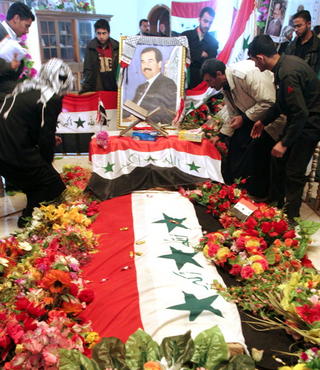
The trial will pick up after a 17-day break but the dock will be without its most important and familiar defendant, Saddam, who was executed December 30 after being convicted of crimes against humanity in a previous trial.
A US official close to the special Iraqi court that is trying the genocide case said that Saddam was no longer an "accused" in the case, which has been in recess since December 21.
"Saddam is dead. From what I understand of law, the case is over against him," the official said on condition of anonymity. "You can't try somebody posthumously [but] the trial will continue against the other accused now."
 |
| EXECUTED CO-ACCUSED: Residents tend to the grave of former Iraqi president Saddam Hussein in Awja, near Tikrit, north of Baghdad, January 7. (REUTERS) |
It has yet to be confirmed, however, whether the Iraqi High Tribunal - which is responsible for trying senior members of Saddam's regime - has officially dismissed the charges against the late president.
The ongoing case centers on the slaughter of 182,000 Kurdish villagers during the so-called Anfal campaign, which ran from 1980 through 1988.
Saddam had been a familiar sight in the court, occupying a front chair and showing defiance since the proceedings began August 21 in Baghdad.
Chief among the co-accused is Ali Hassan Al Majid, widely known as "Chemical Ali." A first cousin of Saddam and former defense minister, he is charged with genocide in the trial.
The other five co-accused have been charged with war crimes and crimes against humanity.
If convicted, the remaining six defendants could face the death penalty.
Iraqi authorities and human rights group accuse Saddam's regime of having meticulously carried out military attacks, some using chemical bombs, against the Kurds.
The co-accused respond that it was a necessary counter-insurgency operation against Kurdish guerrillas who had sided with Iran against Saddam during the peak of the Iran-Iraq war in 1980-88.
Many times at previous sessions, Saddam defended the military action against the Kurds and rejected accusations from witnesses of unlawful killings of civilians.
Dozens of Kurdish witnesses have testified, describing how thousands of men, women, and children had been brutally put to death.
The prosecution has also presented documentary evidence.
Saddam was hanged after he was convicted at a separate trial of crimes against humanity for the execution of 148 Shiites from Dujail town in retaliation for a failed attempt on his life there in 1982.
His execution has stirred global controversy after a mobile phone video of the hanging came to light, in which Saddam was heard being taunted on his way to the gallows.
One guard screamed "Moqtada! Moqtada! Moqtada!" - the name of radical Shiite cleric Moqtada Al Sadr - in a scene that made the execution look more like a sectarian lynching than a court-ordered punishment.
Some contend that the manner in which Saddam died has given him martyr status, and even US President George W. Bush - who ordered the March 2003 invasion that overthrew Saddam's regime - has said that the hanging should have been more dignified.


